When Curtis Hill opened his keynote address at Bryant University’s Day of Understanding, he started with a question: Has there been a time when you needed to change but didn’t know how?
Hill, the founder of an organization that specializes in transforming exclusion into a culture of belonging, spoke to students about unconscious bias and the importance of creating belonging and understanding within a community.
“We have different skills, talents, and lived experiences,” said Hill. “Start finding positive skills and character traits about people and use it to enhance the campus. Just remember, the more differentiated and inclusive your campus is, the more success you will have.”
Celebrating its fifth year, Bryant’s Day of Understanding is an all-day event with programs, workshops, and spaces for critical dialogue to advance awareness about race, accessibility, gender, equity, and other important diversity-related issues. This year’s theme centered on building resilient communities through innovation, inclusion, and sustainability.
“It is important to me and the leaders of the university that we continue to build a community of caring where all are appreciated and respected as individuals, and everyone can thrive in their academic, professional, and personal pursuits,” said Bryant University President Ross Gittell, Ph.D., who challenged students to be active participants, ask questions, and challenge their own perspectives.
Hearing from Provost and Chief Academic Officer Rupendra Paliwal, Ph.D., Associate Vice President of Institutional Diversity, Equity, Inclusion, and Belonging Mailee Kue, Ph.D., and Vice President of Student Affairs, Dean of Students, and Chief Diversity Officer Inge-Lise Ameer, Ed.D., students were reminded of the day’s significance.
“I challenge all of us to stop, listen, reflect, and then respond with the goal of understanding,” said Ameer. “Ask: What can I learn from you today and take with me tomorrow?”
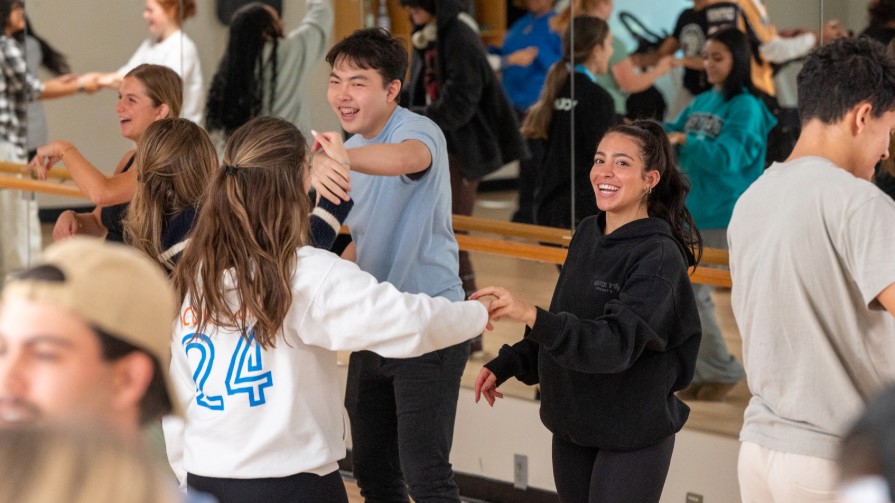
The immigrant experience
Immigrants are well represented among Bryant faculty as well as students, and both populations experience similar challenges and rewards, according to participations at the “I Stand with Immigrants” panel discussion facilitated by Patricia Gomez, senior lecturer in the department of Communication and Language Studies and organizer of the campus-wide I Stand with Immigrants Day of Action, which took place on October 15.
Developing new language skills, adjusting to unfamiliar food, and facing stereotypes and discrimination perpetuated by politicians and the media are common experiences among immigrants at Bryant. Panelists encouraged Bryant students to make connections with international students and travel to other countries to improve their cultural intelligence.
“It’s important to see these different perspectives, not just to be informed but also to see the impact it can have on our careers in the future,” said session attendee Rayan Malak ’27.
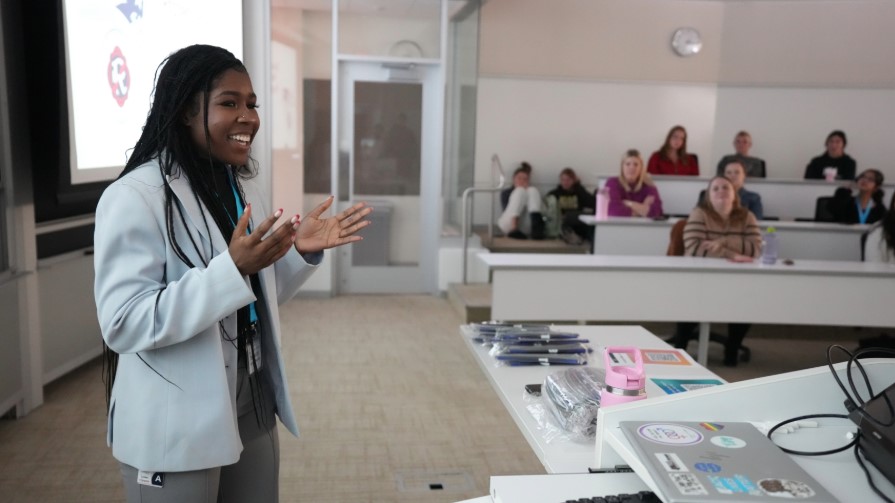
Black in the game
Social and workplace isolation was addressed at the “Exploring Intersectionality on a College Campus” session led by Nilsa Laine ’23, community director for Bristol House and Women's LLC Leadership at Bryant, as well as “Elevating the Game: Black Women in Professional Sports,” facilitated by Veronica Wallace, ’23, ’24MBA.
Laine outlined a research study and video interview with Black female students about the experience of attending a primarily white institution like Bryant. Oftentimes, she said, this can contribute to a student feeling like the sole representative of their ethnic community and gender when discussions about race arise in the classroom or among contemporaries.
Wallace, who serves as a sports management associate for Kraft Sports + Entertainment, where she works with both the New England Patriots and New England Revolution, noted that while the Patriots currently have a Black head coach and quarterback, “often I’m the only woman and the only Black person” at the table in back-office discussions.
For example, backlash to the Patriots’ recent on-field struggles has included a number of racial slurs directed at players. “When all the white men are in a circle talking about these issues, that’s when I felt most uncomfortable,” she said. “So I decided to get out of my comfort zone and speak up. I see my responsibility as setting the stage for the women coming into the industry after me.”
As Wallace’s example demonstrates, the fight against racism requires action.
“Neutrality only benefits the status quo,” said Ralph Tavares Jr., whose discussion, “Building a Foundation for Anti-Racist Practices” included a detailed list of ways to contribute to making Bryant an anti-racist campus, from calling out someone making a racially insensitive joke to registering to vote.
“Find one intentional thing you can do every day as students, faculty, and administrators to support anti-racism,” said Tavares.
The theme of support extended to an “ABCs of LGBTQ” session led by Kelly Boutin, director of Bryant’s Hochberg Women’s Center and Pride Center, and Caroline Cowart, Pride Center coordinator and community director.
Throughout their talk, the pair discussed concepts of gender and sexuality, including the differences — and complex interplay — between gender expression, gender identity, biological sex, and assigned sex. Gender is a scale, said Boutin — and there are people who are not on the scale at all.
Yet the way society approaches these complex concepts can often be confusing, as well as confining, Cowart noted. “No one gets to tell you what your gender is,” Boutin reminded the audience. “Only you know.”
Boutin and Cowart also covered how to be a supportive ally, including the coming out process and respecting pronouns and others’ identities. “People know who they are, it’s your job to listen when they tell you,” said Boutin.
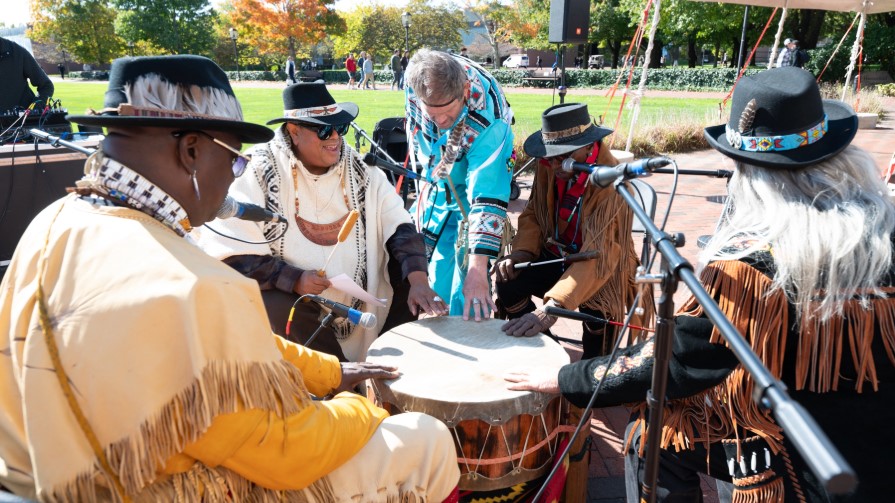
Rethinking disability, mental health
When many of us think of the word “disability,” the first — and sometimes only thing — we think of is visible, physical disabilities, noted Marie Saddlemire, Bryant’s director of accessibility services. In fact, the most commonly used symbol for disability — a depiction of a person in a wheelchair — displays the same thinking.
“I’m here today to debunk that,” said Saddlemire.
Over the course of her panel, “What We Cannot See: Inclusivity, Belonging, and Invisible Disabilities,” she shined a light on the world of invisible disabilities — which can range from dyslexia to depression to ADHD to Crohn’s disease. An estimated 20 percent of American adults have an invisible disability, she said.
It’s everyone’s responsibility, Saddlemire suggested, to find ways to respect individuals' privacy while helping to create inclusive and welcoming environments. Working in small groups, the session attendees considered a range of scenarios involving invisible disabilities and discussed how they might better support those around them.
In another session covering the invisible signs of stress, Management Instructor Maryanne De Chambeau’s ’07MBA discussed how students can recognize the signs of anxiety (think: teeth grinding, headaches, feeling irritable, feeling panicked) and practiced breathing exercises and stretches that could help get them to a calmer state.
“The big thing that causes a lot of stress when you try to realign the world to your agenda. You can only control your response to the constantly changing world,” said De Chambeau.
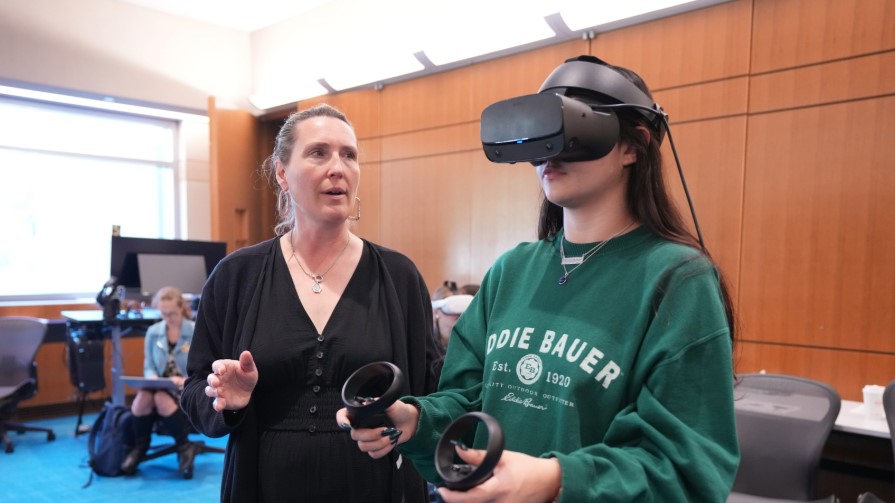
Considering communities impacted by climate change
From the savannas of Kenya to the rainforests of Borneo, students explored environmental justice through virtual reality. Run by the Krupp Library staff, students experienced what it felt like to see ice receding in Greenland, how automatic emissions impact the ocean, and how socioeconomic factors affect community waste disposal.
One of the videos on ocean acidification had students follow a CO2 molecule out of a car exhaust system, into the air, and into the ocean. Taking viewers underwater, students observed a healthy coral reef followed by one affected by climate change and pollution.
Keeping on the climate topic, Information Systems and Analytics department chair Suhong Li, Ph.D., shared research on trends in social media conversations on global warming. Li’s research analyzed the public’s emotional reactions to global warming and extreme weather through advanced topic modeling and large language modeling techniques.
“Emotion analysis indicates that sadness, followed by anger, are the most prevalent emotions in discussions about various weather events,” said Li, noting that floods and droughts or heat waves were the most discussed Twitter conversations around extreme weather.
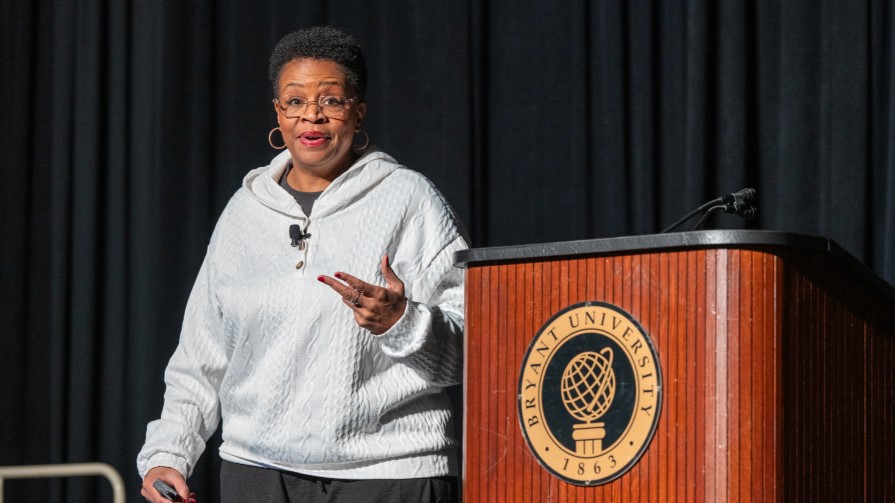
Continuing the message forward
In her closing keynote, author, motivational speaker, leadership coach, award-winning television and radio broadcaster and Syracuse University Hall of Fame scholar-athlete Vera Jones shared the lessons in leadership she had acquired over the course of her life and career. Chief among them, she observed, was the power of empathy, a power that has helped her find her path and weather tragedy.
“Sometimes people say empathy is a weakness when, in fact, it’s a superpower,” she argued. “It simply means the capacity to see or feel what other people are experiencing. How wise that makes you when you can do that.”
At the core of empathy, Jones suggested, is self-awareness — being aware of our cognitive biases and how they blind us from fully seeing those around us as human beings. Only when we understand each other, Jones said, can we succeed.
She likened communication to a game of catch and brought up two members of the audience to demonstrate with a basketball. When the pair communicated with each other, they were able to pass the ball back and forth easily; when they did not, the ball dropped.
The best sort of leader, Jones concluded, understands others and works to support them so that they are at their best. “They don’t care how much you know until they know how much you care,” she said.